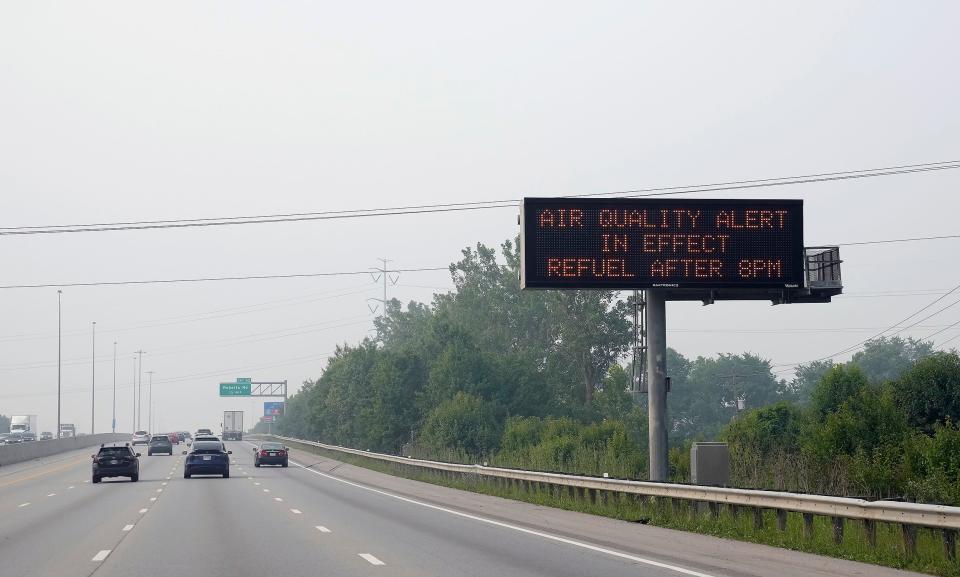Canadian wildfire haze drifts into Ohio. Air quality alert for unhealthy level first since 2003
An air quality alert has been issued for much of central Ohio until midnight Wednesday as smoke from wildfires in Canada continue to move into parts of the United States.
Delaware, Fairfield, Franklin, and Licking counties are expected to have an Air Quality Index of 164 on Wednesday. The Mid-Ohio Regional Planning Commission, which issues the alerts, said Wednesday's level will be the first "unhealthy" level since August, 2003.
"As a cold front departs Ohio, westerly to northwesterly winds will transport dense smoke from Canadian wildfires into the Columbus region, increasing particle levels," according to MORPC.
Today is an Air Quality Alert day in Central Ohio.
To decrease the potential for health issues, everyone is urged to limit prolonged or strenuous outdoor activity.
Visit https://t.co/9aMZfJWNle to sign up for free alerts by email or text. #BeAirAware #AirQuality pic.twitter.com/XelvPNg9CJ— MORPC (@MORPC) June 28, 2023
What's an air quality alert?
MORPC uses the national Air Quality Index scale, which runs from 0 to 500, to measure ozone and particle pollution. When levels reach above 100, air quality is considered unhealthy for sensitive groups, and an air quality alert is issued.

The Environmental Protection Agency's Fire and Smoke Map showed that the AQI for parts of Columbus as high as 154 AQI as of Tuesday afternoon.
At over 150 AQI, some members of the general public may experience health effects; members of sensitive groups may experience more serious health effects. People with respiratory diseases, such as asthma, should limit outdoor exposure.
According to MORPC, sensitive groups include:
Elderly people
Children and teens
People with lung disease
Those who are active outdoors
Some people may also be more genetically sensitive to ozone
MORPC says people in sensitive groups should:
Reduce prolonged or heavy outdoor exertion
Do less intense activities and take more breaks
Watch for coughing or shortness of breath
Schedule outdoor activities in the morning, when ozone levels are lower
People with asthma are also advised to follow their asthma action plans and keep their medication on them.
Canadian wildfire season worst on record
Earlier this month, smoke from Canadian wildfires shrouded Columbus, New York City, Philadelphia and other cities in the northern United States. Columbus was under an air quality alert for days in early June, with residents experiencing air quality that was unhealthy for sensitive groups.
More: Track smoke from wildfires over Ohio
According to the Canadian government, dozens of wildfires currently rage across the country. This year has become the worst fire season on record for Canada, surpassing the previous 1995 in total area burned, CNN reported.
As of Tuesday, Wisconsin, Iowa, Michigan and Indiana were under air quality alerts, and portions of Illinois and Minnesota were also under alerts, according to the NWS.
@Colebehr_report
Cbehrens@dispatch.com
This article originally appeared on The Columbus Dispatch: Why is air quality bad in Ohio today? Canadian wildfires to blame

